外研版(2019)必修第一册Unit 5 Into the wild Grammar 课件(共27张PPT)
文档属性
| 名称 | 外研版(2019)必修第一册Unit 5 Into the wild Grammar 课件(共27张PPT) |  | |
| 格式 | pptx | ||
| 文件大小 | 1.8MB | ||
| 资源类型 | 教案 | ||
| 版本资源 | 外研版(2019) | ||
| 科目 | 英语 | ||
| 更新时间 | 2024-10-19 15:27:39 | ||
图片预览


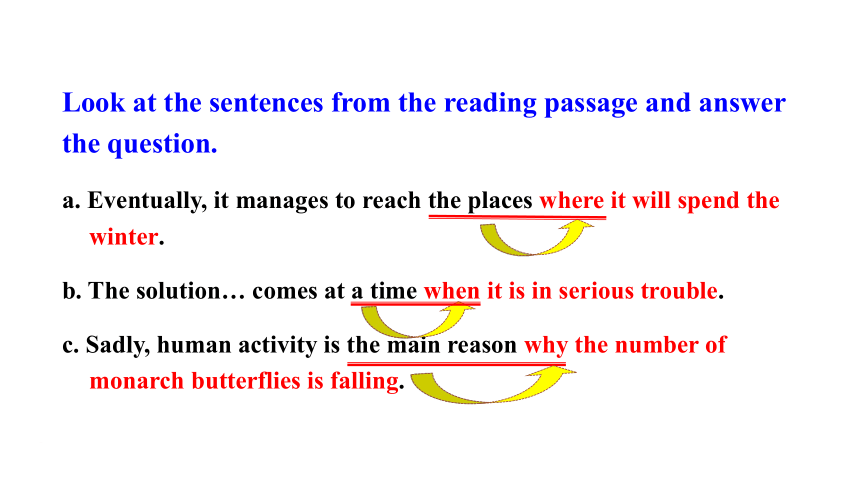

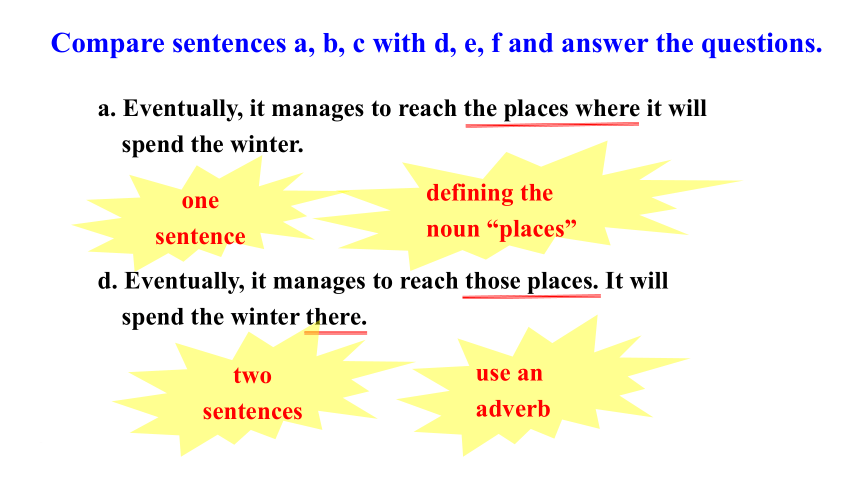
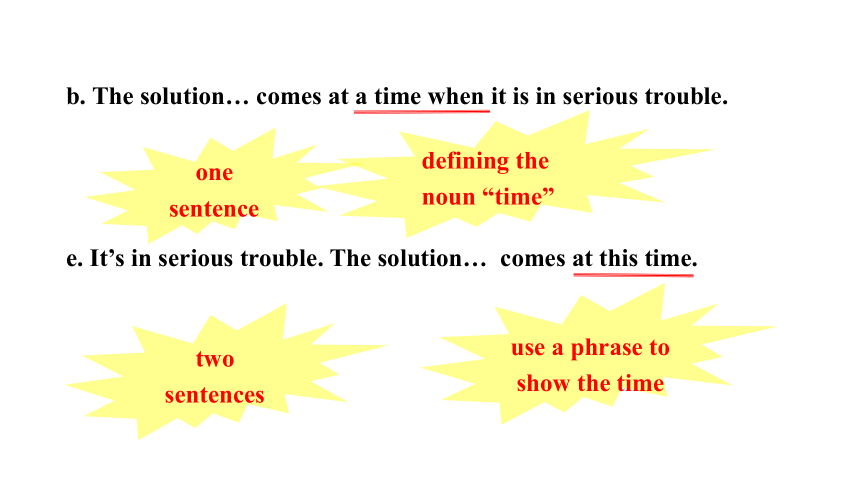
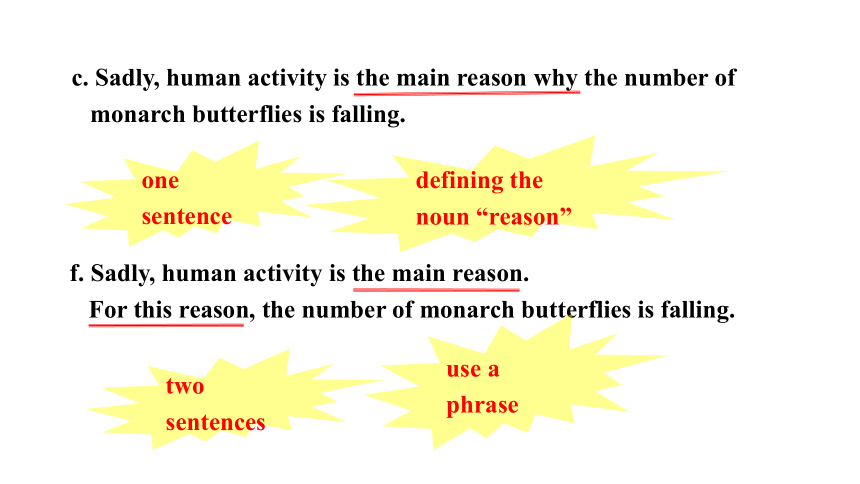
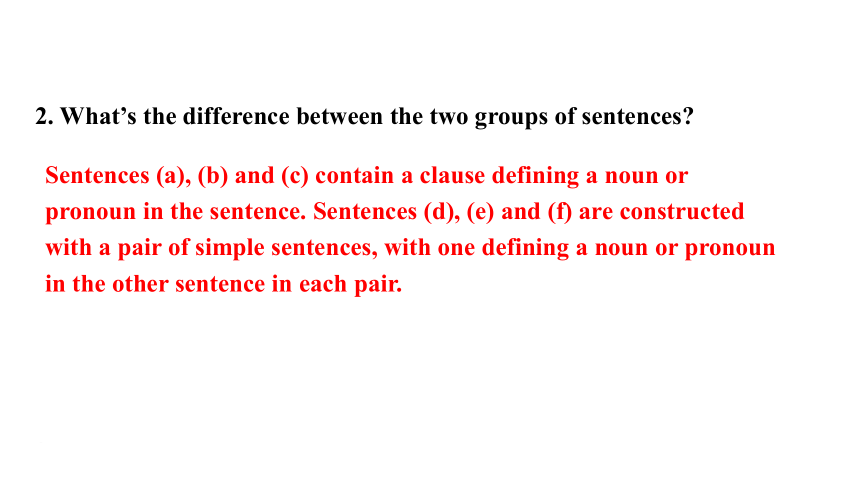

文档简介
(共27张PPT)
Attributive clauses (2)
Unit 5 Into the wild
Grammar
To read the passage and understand the attributive clauses led by where, when and why;
To learn what where, when and why refer to in the sentence;
To know the differences between which/that and where, when, why;
To describe animals by using attributive clauses led by where, when and why;
Learning objectives
Look at the sentences from the reading passage and answer the question.
a. Eventually, it manages to reach the places where it will spend the winter.
b. The solution… comes at a time when it is in serious trouble.
c. Sadly, human activity is the main reason why the number of monarch butterflies is falling.
1. What do “where”, “when” and “why” refer to in each sentences
“Where” refers to “the places” in sentence (a), “when” refers to “a time” in sentence (b) and “why” refers to “the main reason” in sentence (c).
one sentence
d. Eventually, it manages to reach those places. It will spend the winter there.
a. Eventually, it manages to reach the places where it will spend the winter.
two sentences
defining the noun “places”
use an adverb
Compare sentences a, b, c with d, e, f and answer the questions.
b. The solution… comes at a time when it is in serious trouble.
e. It’s in serious trouble. The solution… comes at this time.
one sentence
two sentences
defining the noun “time”
use a phrase to show the time
c. Sadly, human activity is the main reason why the number of monarch butterflies is falling.
f. Sadly, human activity is the main reason.
For this reason, the number of monarch butterflies is falling.
one sentence
two sentences
use a phrase
defining the noun “reason”
2. What’s the difference between the two groups of sentences
Sentences (a), (b) and (c) contain a clause defining a noun or pronoun in the sentence. Sentences (d), (e) and (f) are constructed with a pair of simple sentences, with one defining a noun or pronoun in the other sentence in each pair.
Why does the author choose to use sentences (a), (b), and (c) in the reading passage
thinking
Because there is a closer link and connection between the item and the clause defining it in the sentences (a), (b) and (c). It will also make the passage clearer, and create an emphatic effect on the location, time and reason being defined.
2) In many of the places where the butterfly can be found, people are destroying the natural environment.
Look for more sentences with attributive clauses in the reading passage.
1) These two pieces of information – the time of day
and the point where the sun is in the sky — allow the butterfly to determine the way to go.
先行词
Where在从句中作地点状语
3) They cut down trees and use chemicals that kill the plants that monarch caterpillars eat.
4) If this works, there may come a time when the number of monarch butterflies may increases once again.
在The Monarch’s Journey一文中,还有一个是由关系代词引导的定语从句:
They cut down trees and use chemicals that kill the plants that monarch caterpillars eat.
From: David Waters To: Kay Silverman
Subject: Back to nature
Hi Kay,
We’re having an amazing time here in South Africa. Our accommodation is perfect. It is in a location _______ we can watch animals wandering past on their way to the waterhole.
where
Complete the email with where, when or why.
Sunset is the time of day _______ we sit on the balcony and count how many giraffes or antelopes we can see.
I guess this is the reason _______ this place is so popular. Next week, we are going to fly up to Zambia. That’s one of the countries _______ you can visit the famous Victoria Falls.
See you soon.
David
when
why
where
when
1. I still remember the day when I first came to Yuci.
2. You’ve entered into an age when knowledge makes you rich.
当先行词是表示____的名词(如 time, day, year, month, week等), 且从句成分完整时,定语从句用when引导.
关系副词的选择
时间
1. I still remember the time ______ we first met each other.
2. I still remeber the time __________we spent together.
when
which/that
1. Can you tell me the office where he works
2. People are more concerned about the environment where they live.
当先行词是表示_____的名词(如place, room, airport等),且从句成分完整时,定语从句用where引导.
where
地点
1. This is the place ___________ we visited last time.
2. This is the place _________ he used to work.
which/that
where
关系副词的选择
1. They have reached the point ______ they have to break up with each other.
2. It’s helpful to put children in a situation ________ they can see themseves differently.
除地点名词后,where还可用于case, condition, example, situation, stage, point, system, atmosphere, position等表示抽象地点的名词前。
where
where
where
关系副词的选择
1. Do you know the reason why he was late yesterday
2. This is the reason why he gave up trying in the end.
当先行词是表示原因的名词_______,且从句成分完整时,定语从句用why引导,且只能引导限定性定语从句。
why
reason
1. I won’t believe the reason ___________ you have given me.
2. This is the reason _______ she cied.
that/which
why
关系副词的选择
1. Do you know the teenager ________ you are talking about
2. This is the house _________ I lived in for three years.
2. 介词+关系代词
who/that
which/that
1. Do you know the teenager about ______ you are talking
2. This is the house in _______ I lived for three years.
whom
which
思考:在表示时间、地点和原因状语时,“介词+关系代词”是否可以替换为关系副词“when, where, why”
思考:介词是否可以提前至关系词之前?
1. I still remember the day __________ I lost my money.
2. We visited the yard __________ a famous poet once lived.
3. Patience is a kind of quality, ____________ you can’t work well.
代入法:1. 确定先行词及从句;2. 从句 ? 先行词 (搭配问题)
I lost my money ______ the day 根据先行词的搭配
“介词+关系代词”中介词的确定
on
on which
A famous poet once lived ___ the yard 根据从句中动词的搭配
in
in which
You can’t work well _______ patience. 根据意义确定介词
without
without which
2. 介词+关系代词
定语从句之关系副词when, where, why
This is the place _____________ we visited last time.
This is the place _____________ we visited the equipment设备 last time.
I still remember the time __________ we spend together.
I still remember the time __________ we first met each other.
This is the reason __________ she gave me.
This is the reason __________ she cried.
(
)
定语从句不完整,先行词在定语从句中做宾语,指物
that/which
(
)
定语从句完整,也不缺定语,缺状语,指地点
where
(
)
定语从句不完整,先行词在定语从句中做宾语,指物
that/which
(
)
定语从句完整,也不缺定语,缺状语,指时间
when
(
(
)
定语从句不完整,先行词在定语从句中做宾语,指物
that/which
)
定语从句完整,也不缺定语,缺状语,指原因
why
先行词 关系副词
表时间的名词 when
表地点/抽象地点的名词 where
表原因的名词(reasons) why
做题方法——如何选择关系词:
1. 定位先行词及紧随其后的定从;
2. 判断定从是否缺成分
缺成分—关系代词 (先行词:人/物?)
不缺成分—关系副词 (先行词:时间/地点/原因 )
Summary
做题步骤
画出定语从句,
看定语从句缺不缺主/宾/表
缺
关系代词
that/which
/who/whom/as
不缺
whose
关系副词
when, where, why
缺定语
缺状语
1. He gave me a reason was reasonable.
2. Do you know the reason he is absent
3. There are several reasons school uniforms are a good idea.
4. Pisa is a city has a leaning tower.
5. New York, I visited last year, is a nice old city.
6. The school we visited yesterday is newly built.
7. Is there a shop near here I can buy some flowers.
8. I don’t know the reason she is so crazy about Lu Han.
that/which
why
why
that/which
which
that/which
where
why
Practice
用适当的关系词填空
9. She will fly to Washington she can enjoy herself.
10. April Fool’s Day is a day people play jokes on friends.
11. This is the house was built by my grandfather forty years ago.
12. We don’t know the reason he was absent from the meeting.
where
when
that/which
why
13. We will put off the picnic in the park until next week, the weather may be better.
14. It’s helpful to put children in a situation they can see themselves differently.
15. Shy people often avoid situations would force them into close contact with people.
16. Many of us love July because it’s the month nature’s berries and stone fruits are in abundance.
when
where
that/which
when
Write a passage about the experience between you and the animals, and use some attributive clauses in your passage.
Homework
Attributive clauses (2)
Unit 5 Into the wild
Grammar
To read the passage and understand the attributive clauses led by where, when and why;
To learn what where, when and why refer to in the sentence;
To know the differences between which/that and where, when, why;
To describe animals by using attributive clauses led by where, when and why;
Learning objectives
Look at the sentences from the reading passage and answer the question.
a. Eventually, it manages to reach the places where it will spend the winter.
b. The solution… comes at a time when it is in serious trouble.
c. Sadly, human activity is the main reason why the number of monarch butterflies is falling.
1. What do “where”, “when” and “why” refer to in each sentences
“Where” refers to “the places” in sentence (a), “when” refers to “a time” in sentence (b) and “why” refers to “the main reason” in sentence (c).
one sentence
d. Eventually, it manages to reach those places. It will spend the winter there.
a. Eventually, it manages to reach the places where it will spend the winter.
two sentences
defining the noun “places”
use an adverb
Compare sentences a, b, c with d, e, f and answer the questions.
b. The solution… comes at a time when it is in serious trouble.
e. It’s in serious trouble. The solution… comes at this time.
one sentence
two sentences
defining the noun “time”
use a phrase to show the time
c. Sadly, human activity is the main reason why the number of monarch butterflies is falling.
f. Sadly, human activity is the main reason.
For this reason, the number of monarch butterflies is falling.
one sentence
two sentences
use a phrase
defining the noun “reason”
2. What’s the difference between the two groups of sentences
Sentences (a), (b) and (c) contain a clause defining a noun or pronoun in the sentence. Sentences (d), (e) and (f) are constructed with a pair of simple sentences, with one defining a noun or pronoun in the other sentence in each pair.
Why does the author choose to use sentences (a), (b), and (c) in the reading passage
thinking
Because there is a closer link and connection between the item and the clause defining it in the sentences (a), (b) and (c). It will also make the passage clearer, and create an emphatic effect on the location, time and reason being defined.
2) In many of the places where the butterfly can be found, people are destroying the natural environment.
Look for more sentences with attributive clauses in the reading passage.
1) These two pieces of information – the time of day
and the point where the sun is in the sky — allow the butterfly to determine the way to go.
先行词
Where在从句中作地点状语
3) They cut down trees and use chemicals that kill the plants that monarch caterpillars eat.
4) If this works, there may come a time when the number of monarch butterflies may increases once again.
在The Monarch’s Journey一文中,还有一个是由关系代词引导的定语从句:
They cut down trees and use chemicals that kill the plants that monarch caterpillars eat.
From: David Waters To: Kay Silverman
Subject: Back to nature
Hi Kay,
We’re having an amazing time here in South Africa. Our accommodation is perfect. It is in a location _______ we can watch animals wandering past on their way to the waterhole.
where
Complete the email with where, when or why.
Sunset is the time of day _______ we sit on the balcony and count how many giraffes or antelopes we can see.
I guess this is the reason _______ this place is so popular. Next week, we are going to fly up to Zambia. That’s one of the countries _______ you can visit the famous Victoria Falls.
See you soon.
David
when
why
where
when
1. I still remember the day when I first came to Yuci.
2. You’ve entered into an age when knowledge makes you rich.
当先行词是表示____的名词(如 time, day, year, month, week等), 且从句成分完整时,定语从句用when引导.
关系副词的选择
时间
1. I still remember the time ______ we first met each other.
2. I still remeber the time __________we spent together.
when
which/that
1. Can you tell me the office where he works
2. People are more concerned about the environment where they live.
当先行词是表示_____的名词(如place, room, airport等),且从句成分完整时,定语从句用where引导.
where
地点
1. This is the place ___________ we visited last time.
2. This is the place _________ he used to work.
which/that
where
关系副词的选择
1. They have reached the point ______ they have to break up with each other.
2. It’s helpful to put children in a situation ________ they can see themseves differently.
除地点名词后,where还可用于case, condition, example, situation, stage, point, system, atmosphere, position等表示抽象地点的名词前。
where
where
where
关系副词的选择
1. Do you know the reason why he was late yesterday
2. This is the reason why he gave up trying in the end.
当先行词是表示原因的名词_______,且从句成分完整时,定语从句用why引导,且只能引导限定性定语从句。
why
reason
1. I won’t believe the reason ___________ you have given me.
2. This is the reason _______ she cied.
that/which
why
关系副词的选择
1. Do you know the teenager ________ you are talking about
2. This is the house _________ I lived in for three years.
2. 介词+关系代词
who/that
which/that
1. Do you know the teenager about ______ you are talking
2. This is the house in _______ I lived for three years.
whom
which
思考:在表示时间、地点和原因状语时,“介词+关系代词”是否可以替换为关系副词“when, where, why”
思考:介词是否可以提前至关系词之前?
1. I still remember the day __________ I lost my money.
2. We visited the yard __________ a famous poet once lived.
3. Patience is a kind of quality, ____________ you can’t work well.
代入法:1. 确定先行词及从句;2. 从句 ? 先行词 (搭配问题)
I lost my money ______ the day 根据先行词的搭配
“介词+关系代词”中介词的确定
on
on which
A famous poet once lived ___ the yard 根据从句中动词的搭配
in
in which
You can’t work well _______ patience. 根据意义确定介词
without
without which
2. 介词+关系代词
定语从句之关系副词when, where, why
This is the place _____________ we visited last time.
This is the place _____________ we visited the equipment设备 last time.
I still remember the time __________ we spend together.
I still remember the time __________ we first met each other.
This is the reason __________ she gave me.
This is the reason __________ she cried.
(
)
定语从句不完整,先行词在定语从句中做宾语,指物
that/which
(
)
定语从句完整,也不缺定语,缺状语,指地点
where
(
)
定语从句不完整,先行词在定语从句中做宾语,指物
that/which
(
)
定语从句完整,也不缺定语,缺状语,指时间
when
(
(
)
定语从句不完整,先行词在定语从句中做宾语,指物
that/which
)
定语从句完整,也不缺定语,缺状语,指原因
why
先行词 关系副词
表时间的名词 when
表地点/抽象地点的名词 where
表原因的名词(reasons) why
做题方法——如何选择关系词:
1. 定位先行词及紧随其后的定从;
2. 判断定从是否缺成分
缺成分—关系代词 (先行词:人/物?)
不缺成分—关系副词 (先行词:时间/地点/原因 )
Summary
做题步骤
画出定语从句,
看定语从句缺不缺主/宾/表
缺
关系代词
that/which
/who/whom/as
不缺
whose
关系副词
when, where, why
缺定语
缺状语
1. He gave me a reason was reasonable.
2. Do you know the reason he is absent
3. There are several reasons school uniforms are a good idea.
4. Pisa is a city has a leaning tower.
5. New York, I visited last year, is a nice old city.
6. The school we visited yesterday is newly built.
7. Is there a shop near here I can buy some flowers.
8. I don’t know the reason she is so crazy about Lu Han.
that/which
why
why
that/which
which
that/which
where
why
Practice
用适当的关系词填空
9. She will fly to Washington she can enjoy herself.
10. April Fool’s Day is a day people play jokes on friends.
11. This is the house was built by my grandfather forty years ago.
12. We don’t know the reason he was absent from the meeting.
where
when
that/which
why
13. We will put off the picnic in the park until next week, the weather may be better.
14. It’s helpful to put children in a situation they can see themselves differently.
15. Shy people often avoid situations would force them into close contact with people.
16. Many of us love July because it’s the month nature’s berries and stone fruits are in abundance.
when
where
that/which
when
Write a passage about the experience between you and the animals, and use some attributive clauses in your passage.
Homework
